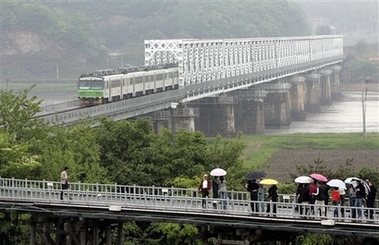Trains cross border dividing Koreas
(AP)Updated: 2007-05-17 14:38
MUNSAN, South Korea - Trains crossed the heavily fortified Demilitarized Zone on Thursday for the first rail journey through the border dividing the two Koreas in more than half a century, the latest symbol of historic reconciliation between the longtime foes.
"It is not simply a test run. It means reconnecting the severed bloodline of our people. It means that the heart of the Korean peninsula is beating again," Unification Minister Lee Jae-joung said at a ceremony at Munsan station, 7 miles south of the Demilitarized Zone, before boarding the train.
The two Koreas "should not be derailed from the track or hesitate" in their moves toward unification, North Korean Senior Cabinet Councilor Kwon Ho Ung said.
However, Kwon also repeated the North's claims that outside powers - usually a reference to the United States - were the main obstacle to reconciliation between the Koreas.
"Even at this point, challenges are continuing from divisive forces at home and abroad who don't like reconciliation and unification of our people," Kwon said.
The tests include two five-car trains with 150 people aboard - one departing from the North and another from the South. Both trains will return later Thursday after spending a few hours on the opposite side.
On the western side of the border, 17 miles of track have been laid between the South's Munsan and Kaesong in the North. The new eastern line links North Korea's Diamond Mountain with Jejin in the South across 16 miles of track.
Soldiers in camouflage uniforms opened the barbed wire-topped gates to the DMZ on the western track to allow the train to pass, while a flurry of white balloons was released into the sky as the railcars headed into the border zone that runs the entire 156-mile-long width of the peninsula.
One of the passengers on the train, Yang Hyun-wook, head of the Seoul office of the Korea Railway Corporation, said the journey would be emotional.
"I think it should have happened earlier, but I hope this will be an opportunity for South and North Korea to become one," Yang, 55, said before boarding.
Yang Seok-hwan, 75, said the town where he was born is just south of the border where no civilians are now allowed, and he thought he would be able to take the train when some community officials asked him to attend the ceremony.
"I'm disappointed. I thought I could take the train if I come here," he said. "My hometown is just over there, but I haven't seen it for 50 years. I want to see my hometown again before I die."
The two Koreas resumed efforts at rapprochement after North Korea agreed in February to take initial steps to dismantle its nuclear weapons programs.
However, Pyongyang failed to shut down its sole bomb-making reactor by a mid-April deadline under that agreement with the US and other regional powers. The North has said it will not move to disarm until a separate dispute over frozen funds is resolved, but that has been held up by technical issues involved in transferring $25 million in its accounts.
The train test will be the latest hole punched through the DMZ since the two Koreas embarked on unprecedented reconciliation with their first-and-only summit in June 2000. Roads also have been restored and thousands of South Koreans cross annually as tourists visiting Diamond Mountain or to work in the joint-Korean industrial zone in Kaesong.
For South Korea, restoration of rail travel would help end its virtual island status, given the only land route out is through North Korea. A rail link could reduce delivery costs for its export-driven economy.
The rail test has been beset by repeated delays in the past, mainly because of the objections of North Korea's influential military.
It remains unclear when any regular train service between the two Koreas would start.
|
||
|
||
|
|

